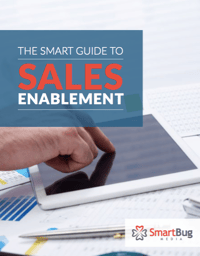
Why Affiliate Marketing Could Be Your Secret Lead Generation Weapon in 2018
February 7, 2018
By Drew Cohen
As marketers or business owners, we’re always trying to stay ahead of the curve with the latest and greatest tactics and technology. But, sometimes, a strategy with great potential has been staring us in the face for years and we just haven’t given it the chance it deserves. That is the case with affiliate marketing. Sure, there are hundreds of blog posts out there with step-by-step guidelines on how to turn affiliate marketing into a profitable side-hustle business, but these guides are rarely geared toward business owners or marketers who are looking to make a difference at their organization. This post will be focused on exactly those people. We’ll dive into what affiliate marketing is, how it works, and where to start if it is something you are interested in pursuing.
The Overview of Affiliate Marketing
Chances are high that you click on an affiliate marketing link multiple times each week without even knowing it. If you’ve ever browsed one of your favorite websites and they referenced other products, there’s a good chance that they have an affiliate agreement with a merchant. To help make things a bit more clear, here’s a screenshot from 9To5Toys, a blog for tech geeks like me that shows the latest deals on gadgets and electronics.

You will notice that they reference the product, and there are links to both Amazon and Best Buy. Here is where things get interesting! These are not just ordinary links. These are affiliate links. When these links are clicked and a user makes a purchase on Amazon’s or Best Buy’s website, 9To5toys makes a specified amount of commission based on their affiliate agreement with the merchant (in this case, Amazon or Best Buy).
A Clear Breakdown of the Cast of Characters
There are two characters that need to be fully understood here. They work together, and the details of the relationship are clearly understood prior to beginning the engagement.
Merchant: This is the seller or brand that is being promoted. They have something to sell and are willing to pay a commission to affiliates when traffic that is referred to their website turns into conversions.
Affiliate: This is where the webmaster, marketer, or publisher comes into the picture. This is someone who can make money from the merchant by promoting certain products. Affiliates place specific, trackable links on their web property that direct to the merchant’s product or brand. When traffic converts, they are paid a commission.
This may have sparked your interest, but it may also sound really complicated. You might be wondering how these magical affiliate links get created or who handles the payouts when an affiliate earns commission. There are companies out there, such as CJ Affiliate by Conversant or LinkConnector, that serve as affiliate networks. The merchant can post their offers in the network (for example: what they are willing to pay per conversion), and that merchant uploads graphic assets and other links that the affiliate can simply embed into their website on sidebars, blog posts, text links, and so on.
Getting Started with Affiliate Marketing
The notion that affiliate marketing is only for gigantic websites with millions of unique visitors is a thing of the past. In the affiliate model, you can receive commission in a pay-per-lead model, but the pay-per-conversion model is much more common. With that said, there is very little risk to the merchant. If there are no conversions, they don’t pay (other than any monthly membership fees charged by the affiliate network).
If you are a marketer or a business owner who is thinking about ways to drive traffic to your business, it’s time to consider whether affiliate marketing would be a fit for you. Whether you are an IT company in Los Angeles serving small and medium businesses or a massive company like Amazon serving customers worldwide, the first question you should ask yourself is, are there websites out there that have audiences who would more likely than not have interest in your products or services? If the answer to this question is yes, the next question you need to ask is, are you interested in the pay-per-lead or pay-per-conversion model? Using the example of the IT company in Los Angeles, this company would opt for the pay-per-lead model since they are not selling anything online and are instead looking for leads. Once this is determined, find a reputable affiliate network of your choice and join the network. I highly recommend joining a more well-known network, since they have a larger network of existing affiliates who they can reach and introduce to your new merchant offer.
Once you join a network as a merchant, you will post your offer, and affiliates can begin requesting access to join your program. You can set your preferred settings so that you review all applications, or you can choose auto-accept. In the beginning phases of your affiliate marketing campaign, I recommend reviewing all applications so that you have more control over where your brand is being promoted. If you’ve posted your offer and have not found much success using the network’s existing membership base, this is where your expertise of your industry comes into play. Going back to the IT company example: Maybe they frequently work with restaurants in the area. They could let the restaurant know about this new opportunity, and the restaurant could join the affiliate network as an affiliate. Once joined, the restaurant could simply add a link on their website and they’d be off and running! As another idea, maybe that IT company buys all of their office furniture from a local furniture store. Chances are high that the local shop also has customers who would be in need of IT services, so why not ask that local furniture store if they’d be interested in exploring another revenue stream? As long as it makes sense for both parties, there’s a conversation worth having.
I frequently see people join a network, see no immediate results and traction, and let the campaign fall by the wayside. Remember: No one knows your business as well as you do, so leverage your knowledge and think outside of the box for who may be a great fit as an affiliate. They don’t have to be a massive company with millions of followers on social media. They just have to have a decent following, an engaged audience, and a potential interest in or need for your product or services.
Let us know by tweeting us at @smartbugmedia if you’ve ever considered affiliate marketing for your business. If you haven’t, consider starting a list of individuals or businesses you’ve worked with in the past who could be affiliates for your next campaign!
.jpg?width=120&height=120&name=DrewCohen-3%20(1).jpg)
About the author
Drew Cohen was formerly the Senior Director of Revenue Operations at SmartBug. Drew developed strategies for organizations in both B2C and B2B verticals. He has unique experience in private-equity owned organizations, early-stage technology startups, sports & entertainment and healthcare. When not marketing, you can find Drew yelling at his television during any Philadelphia team's sporting event. Read more articles by Drew Cohen.







